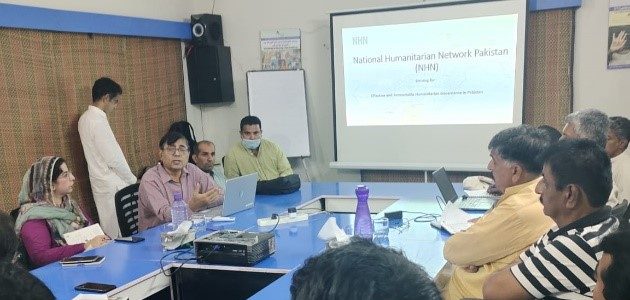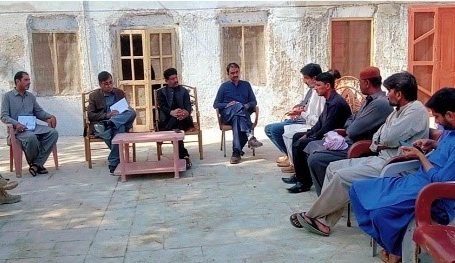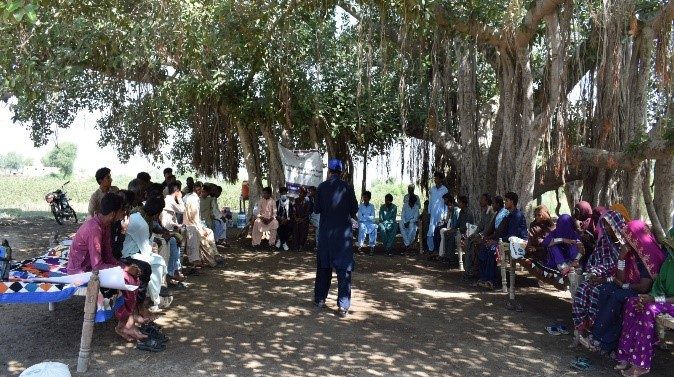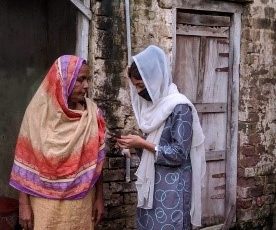Localized Humanitarian Action & Climate Change
(Contributing SDGs: 7, 11, 13)
The CSSP under the theme Localized Humanitarian Action & Climate Change aims to improve the capacity of local communities to respond to climate change-induced disasters through localized humanitarian action. This could involve building resilience and preparedness in vulnerable communities to cope with the impacts of climate change and developing sustainable solutions that reduce vulnerability and enhance adaptive capacity. The key strategies adopted in CSSP’s humanitarian work include policy formulation, close coordination and facilitation services for line departments and stakeholders, awareness raising through IEC materials, TV and Radio programs, conducting research, need assessments and construction of physical infrastructure.
Key Objectives
- To improve the capacity, by building resilience and preparedness, of local communities to respond to climate change-induced disasters through localized humanitarian action.
- To work with all local stakeholders in disaster preparedness, response, rehabilitation, and recovery phases.
- To develop and do advocacy on policy reforms for mitigating climate change and adopting alternative energy sources.
Key Interventions
National Humanitarian Network (NHN)
The CSSP played a lead role in establishing the National Humanitarian Network (NHN) Sindh Chapter and had been representing Sindh Province at NHN’s Central Executive Committee as CEC member since 2011. The National Humanitarian Network (NHN) is a network of National Local NGOs in Pakistan, led by an elected Chair and Central Executive Committee nationally, with provincial chapters in five provinces (Punjab, Sindh, Balochistan, Khyber Pakhtunkhwa and Gilgit Baltistan). NHN was established to act as an independent and vibrant voice to engage with stakeholders throughout Pakistan for promotion of humanitarian values by influencing policies and building capacities to ensure right based humanitarian response.
Data Collection and Digital Mapping in flood-affected districts
CSSP along with other Collective Action Consortium members conducted data collection and digital mapping in 15 flood-affected villages of District Dadu, Taluka Khairpur Nathan Shah, with the overall objective of creating a cost-effective, sustainable village development model. The consortium’s approach involves joint efforts and information sharing among member organizations, as well as leveraging past experiences to replicate successful models. The data collection exercise aimed to gather information on the current situation in the affected villages, including the extent of damage caused by the floods and the needs of the local communities. The collected data was used to develop an action plan that addresses the most pressing issues and provides a sustainable solution for long-term development.
Community Based Contingency Planning
The CSSP during the floods in 2021 developed community based contingency plans in five (05) UCs of Taluka Shuja Abad, district Mirpurkhas with the consultative process including government, non-government and community representatives. During the planning exercise included working on potential natural disasters expected in the village/UC and its preventive measures, resources available within the villages/UC, the identification of suitable spots in case of migration, communication system for upcoming disaster(s), and establishing a village level disaster management committee.
Heat Wave Anticipatory Response
The CSSP’s Heatwave anticipatory response was initiated in response to the early warning issued by authorities in the District Shaheed Benazirabad. The project focused upon older people, people with disabilities, daily wages, labors & travelers on route to their destinations using public transport and people living in congested shelter have no proper ventilation. CSSP provided 1005 heat wave protection kits and installed five (05) heat wave cooling stations on prominent places, where the visitors were provided cold water, syrup, rest area and other small essential items to protect them from heat. CSSP also supported the health department for establishing heatstroke protection ward. Additionally, heatwave prevention awareness messages through brochures, pamphlets, FM and cable TV messages were also circulated among masses.
Flood Response
Monsoon Rain Flood 2022
- Conducted a Rapid Need Assessment (RNA) using kobo toolbox in three (03) districts of Mirpurkhas region where around 5000 households were accessed for data collection purpose. The RNA was conducted in most affected UCs to assess the damages of households affected by the floods. A total of 200 youth were engaged in conducting surveys in Mirpurkhas & Sanghar districts while 14 CG members were engaged in Umerkot District. The findings of RNA report were shared with district administrations, INGOS, NGOs, Charity Organizations, CBOs and philanthropists.
- A Flood emergency hub for Southern Sindh districts was declared by the National Humanitarian Network (NHN) and the emergency cell was established at CSSP Hyderabad Office. Weekly coordination meetings and webinars were organized for continuous one and half month. The discussions focused on women protection/safety, shelter, WASH, food security, agriculture & livestock damages, Child Protection, NOC issues for the relief agencies.
- Issued daily flood situation reports (Sitreps) for consistent 18 days of Dadu, Mirpurkhas, Umerkot, and Sanghar districts. The reports were shared with relevant organizations &departments. Additionally, CSSP also updated the 5Ws Matrix and shared with the UN OCHA in monsoon floods.
- Conducted Weekly webinars on different themes of the flood emergency
- Formed a consortium “Collective Action Consortium” (CAC) of five organizations (CSSP, SPARC, DevCon, GSF, IRIS) on the integrated development model based on the learning and experiences of partners in their respective thematic areas in the flood affected UCs of Taluka KN Shah of Dadu District. The aim was to propose/develop a sustainable model through joint venture for integrated development to cover the losses and help in recovery, rehabilitation, and reconstruction phases.
- The CSSP’s Rozgar Centers in Mirpurkhas & Sanghar were utilized for organizing the medical camps, relief distribution points and Temporary Learning Centers (TLCs)
- The CSSP’s community structures/groups based in different districts including Community Groups (CGs), Citizen Support Groups (CSG), the Women Leader Forum (WLF), Local Resource Persons (LRPs), community youth group (CYGs), District Women Group (DWG) and faith leaders provided volunteer support and played active role in flood response and recovery. The CSG and WLF members conducted meetings with PDMA and Additional Chief Secretary Sindh and presented the “Charter of Demand” for district Mirpurkhas. In Umerkot CGs and DWG played active role as volunteer with philanthropist and other GNO and INGOs to support flood affected communities.
- Conducted eight (08) health and hygiene sessions through community groups (CYG, DWG, and CGs) which were attended by 930 community members covering 20 UCs. Additionally, health & hygiene kits were distributed among 315 HH of Salehpat, Sukkur.
- Established a Temporary Learning Centre (TLC) at district Umerkot with the support of SELD and UNICEF
- Organized medical camps and ration distribution camps.
Rapid Flood Assessments 2020
The CSSP conducted rapid flood assessment 2020 in 05 UCs of district Mirpukhas, 10 UCs of district Umerkot and 10 UCs of district Tharparkar and urban UCs of Qasimabad and Latifabad of district Hyderabad. The assessment was carried out through KIIs, FGDs and direct observation checklist. After assessment CSSP shared its findings & recommendations with relevant departments and organizations working in the targeted areas so they can undertake relief efforts. CSSP, with the help of philanthropists, constructed 20 water tanks to help the affected communities to store water.
The CSSP also conducted Johi Rain flood assessment in 2020 consequent to heavy rainfalls that created flood situation in District Dadu. The report suggested that support and attention was required for elderly people and persons with disabilities in terms of medical assistance, food packages and cash grants.
Response in Mega Floods 2010-11
CSSP was engaged its 1560 trained youth in the flood response activities. The youth were trained in camp management and were deployed in relief camps, where they conducted camps need assessment, camps registration, demographics of the communities, and supported/facilitated government and nongovernment organizations. CSSP also established a help line in the office to report any issues at camps in other areas.
COVID-19 Response
- Identified and trained youth groups who implemented 10 Social Action Projects (SAPs) on COVID-19 in three districts of Sindh. The SAPs included mass awareness campaigns, hygiene sessions to school children, distribution of face masks, COVID awareness walk/ rally, theatre performances, and webinars. A total of 10 youth groups comprising girls and boys implemented the SAPs and covered a total community outreach of 7550.
- Developed Sitreps covering COVID-19 statistics in the targeted districts and shared with relevant stakeholders.
- Conducted mass level awareness raising on COVID-19 by organizing TV talk shows, circulating FM radio messages, installing billboards in cities/targeted districts, and establishing IEC material for awareness raising.
- Established a help/information desk at CSSP district offices which provided helpline numbers of emergency and complaint centers, government and private COVID-19 testing facilities, and available isolation & quarantine facilities/centers.
- Established quarantine/isolation facilities at CSSP Mithi & Umerkot offices and offered those facilities to district administration to support them in accommodating the COVID-19 affectees.
- Distributed 1400 soaps among the 350 teachers and students with the support of Indus Consortium to promote hygiene and cleanliness. In addition, hand washing demos and COVID hygiene awareness sessions were also delivered by the CSSP staff.
- Became part of District Administration’s “Corona Relief Committee” for conducting awareness sessions of community, raising funds from philanthropists, distributing ration, and extending administrative support in the Ehsas Kafalat camps. The Committee was able to collect funds worth 200,000 PKR.
- Conducted a research study in collaboration with the Mehran University Institute of Science & Technology Development (MUISTD) on Socio-economic impact of COVID-19 on women and marginalized communities in district Mirpurkhas.
Climate Change
Research Study on Alternative Energy Projects to mitigate climate change affects
The CSSP conducted a research study to analyze community attitudes, support, and opposition to alternative energy projects for just transition and benefit sharing in 2022. Alternative renewable energy sources such as solar, wind, hydro, and geothermal power can play a significant role in supporting efforts to mitigate climate change. The goal was to bring about changes in policies and practices for just and fair energy transition based on the concerns of local communities and benefit sharing in two ARE projects including Jhimpir wind power project in Sindh and Quaid-e-Azam solar power project in Bahawalpur.
Social Action Projects (SAPs) on Climate Change
The CSSP’s trained 26 youth groups (aged 18-35) implemented 26 Social Action Projects (SAPs) on COVID-19 and Climate Change in three districts of Sindh. The SAPs were in consonance with mitigating climate change effects thereby focused on clean & green society, preventing use of plastic bags, tree plantation, urban forestry, and clean public parks.
A tree plantation drive was organized in Mirpurkhas and Sanghar districts where youth community groups planted about 200 trees and took part in the noble cause of overcoming the effects of climate change.
Awareness Campaign on Climate change
The CSSP carried out an awareness campaign on climate change in Mirpurkhas, Sanghar and Umerkot districts by disseminating posters and pamphlets on heatwave prevention, broadcasting Radio messages on climate change, and engaging faith actors for awareness raising on climate change through sermons. The sessions covered how climate change affected communities and increased vulnerabilities for women and girls.
Sindh Drought & mitigation Policy Consultations
Policy Consultation: The CSSP with the support of National Humanitarian Network (NHN) facilitated the Sindh drought & mitigation policy consultations in 2017-2018. The policy consultations focused on the drought situation in district Tharaparkar. Approximately 10-15 technocrats were engaged who provided feedback on the policy.
Presenting position paper: The CSSP from the platform of the NHN worked on the position paper of Thar drought situation and how it contributed to malnutrition in children and their increased death toll. The position paper included findings and recommendations for policy makers.






